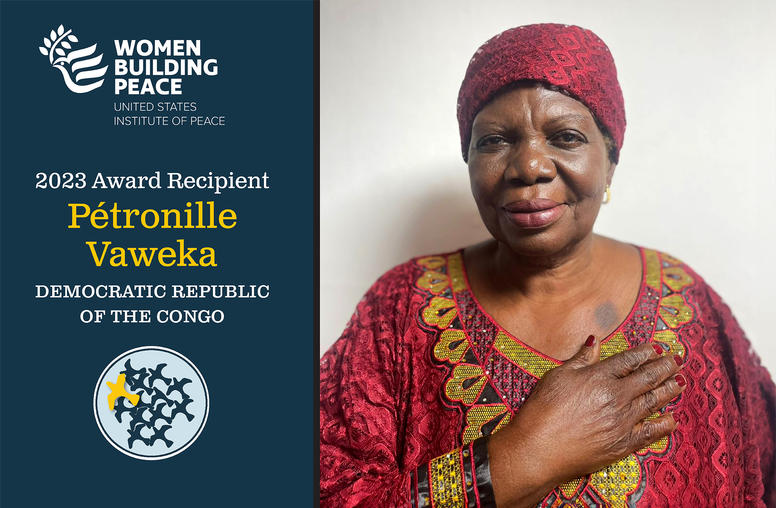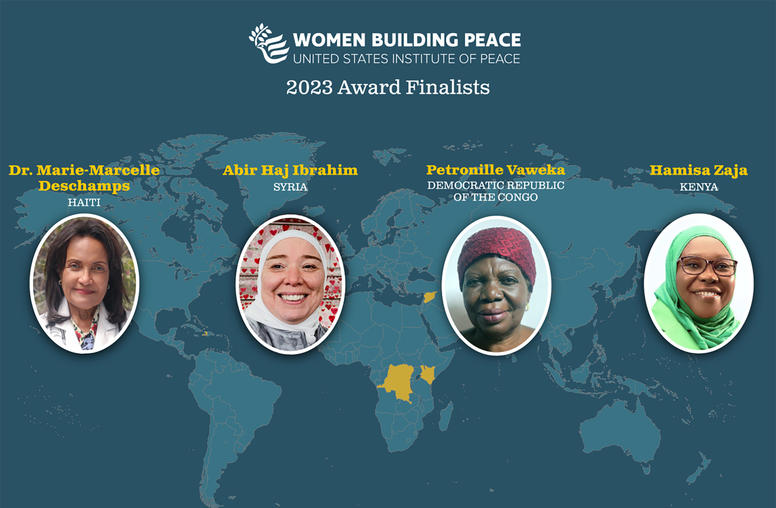New USIP Book Addresses Power and Protection of Women in War
The United States Institute of Peace announces the publication of Women and War: Power and Protection in the 21st Century edited by Kathleen Kuehnast, Chantal de Jonge Oudraat, and Helga Hernes. The book addresses the reality that women have long been uncounted victims of war and examines the increased role of women as armed combatants in conflicts, while asking the question of how to bring women into the setting the agenda for peacebuilding in conflict affected countries. The volume takes stock of the current state of knowledge on women, peace and security issues and offers steps to ensure that women are protected, counted, and engaged, during and after conflict.
For Immediate Release, March 8, 2011
Contact: Allison Sturma, 202-429-4725
Meg Pierannunzi, 202-429-4736
(Washington)—The United States Institute of Peace (USIP) announces the publication of Women and War: Power and Protection in the 21st Century edited by Kathleen Kuehnast, Chantal de Jonge Oudraat, and Helga Hernes. The book addresses the reality that women have long been uncounted victims of war and examines the increased role of women as armed combatants in conflicts, while asking the question of how to bring women into the setting the agenda for peacebuilding in conflict affected countries. The volume takes stock of the current state of knowledge on women, peace and security issues and offers steps to ensure that women are protected, counted, and engaged, during and after conflict.
Ten years ago, the United Nations Security Council passed Resolution 1325 (UNSCR 1325), which calls for women’s full participation in promoting peace and security and for greater efforts to protect women in war, particularly from sexual violence. However, today gender-based analysis of conflict often remains outside the mainstream of security dialogues. This volume underscores that much remains to be done to develop effective conflict prevention and management strategies that are inclusive of women and that give women a voice at the negotiating table.
“Despite the increased awareness at the policy level of why gender analysis in international peace and security is critical, the actual implementation of gender-sensitive policies in our defense, diplomacy, and development work is still in an early phase. The importance of UNSCR 1325 cannot be underestimated, as it has put forward a framework that addresses the need for the protection of women in war, but simultaneously the resolution recognizes that women are critical and powerful actors in negotiating peace and conflict management,” states Kuehnast, director of the Gender and Peacebuilding Center at USIP. “This volume highlights innovative approaches to date to ensure the greater participation of women at the negotiating table, and the ways in which women will make a difference in the security arena over the next decade.”
The editors highlight the resolution’s potential to advance the rights of women around the world. They take a forward-looking approach, emphasizing that setting a well-grounded research agenda is the first step toward realizing the resolution’s dual goals of power and protection.
“The lack of accurate data about how gender affects issues of power and inequality helps sustain many of the myths surrounding the roles of men and women and reinforces stereotypes,” states de Jonge Oudraat, head of the Jennings Randolph Fellowship Program at USIP. “Credible data could both demonstrate to policymakers that the problems of women in war are real and pressing, as well as pointing them toward solutions. Likewise, sex-disaggregated conflict data on casualties and causes of death could assist policymakers toward effective interventions to protect women from violence during and after conflict.”
Several of the book’s chapters focus on preventing sexual violence during war. Co-editor Helga Hernes, Senior Adviser of the Peace Research Institute Oslo (PRIO) stresses that “Sexual violence is both a consequence and a symptom of powerlessness and poverty. Even though the United Nations and some governments now are addressing the issue, the root causes still are not being dealt with, and therefore, victims, many of whom are women and children, do not have real protection.”
Women and War outlines an action plan for revitalizing UNSCR 1325, an ambitious and achievable agenda for action on women and armed conflict.
###

